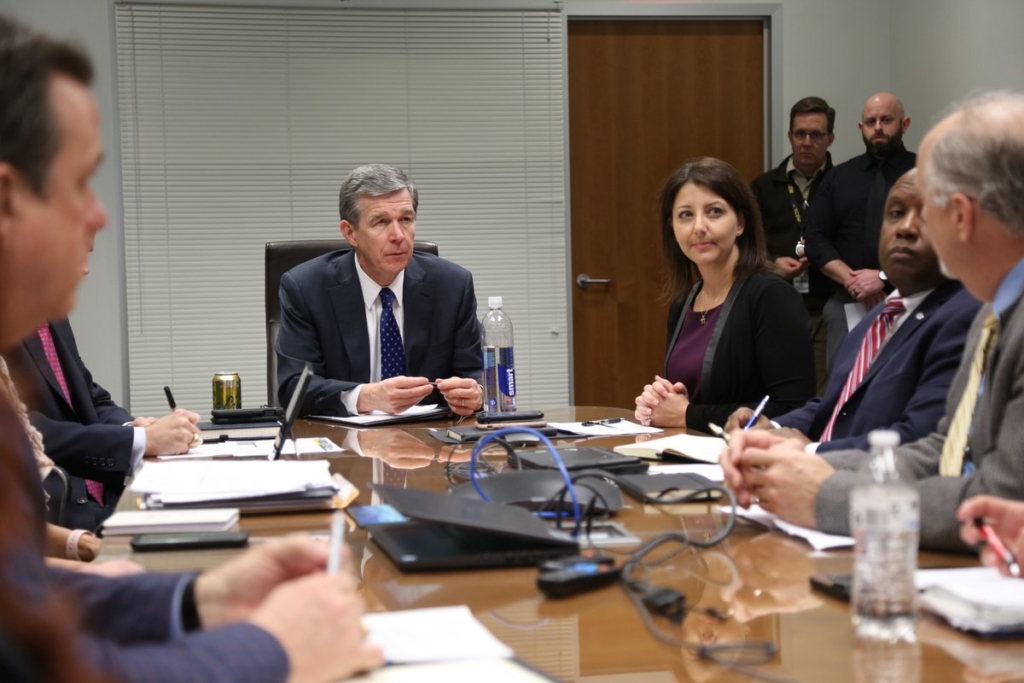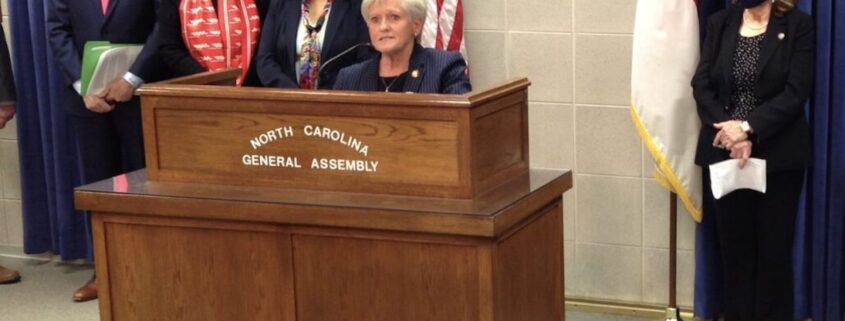Gale Adcock: Long Session Should Live Up to its Name
Cary, NC — The latest legislative update from the blog of NC Representative Gale Adcock.
It’s hard to believe we’ve rounded the corner on the first 2 months of the 2021 legislative session. Things got off to a flying start with the appropriation of additional federal COVID relief funds.
COVID Response
We passed a $2.24 billion COVID relief bill in February and a second $1.7 B bill in March; both were quickly signed into law. A third appropriations bill will be filed in a few weeks following Congress’ recent passage of the $1.9 trillion American Rescue Plan.
North Carolina is projected to receive $5-7 billion and, unlike previous federal aid packages, ARP includes funds sent directly to cities and towns to help with their pandemic recovery efforts.
Spotlight On Health Care

As a nurse practitioner in family practice for 29 years, access to health care remains one of my top priorities. So far this session I’ve filed bills to:
- place a school nurse in every public school,
- allow pharmacists to give injectable long-acting drugs,
- improve state standards for lead screening in children, and
- increase access to care provided by advanced practice registered nurses.
I’m also a co-sponsor of bills to:
- modernize the practice of audiology,
- increase transparency of prescription drug costs,
- help children with autism, increase access to telehealth,
- add telepsychiatry sites in counties without psychiatrists, and
- add North Carolina to the occupational therapy interstate compact.
There is much work to be done to increase access to health insurance, thereby increasing access to care. To evaluate our options, Governor Cooper appointed a large group of stakeholders representing business, economic development, non-profits, health care and government to serve on the Council on Health Care Coverage.
Facilitated by the Duke Margolis Center for Health Policy, the group had 4 half-day meetings in December and January and produced guiding principles to use as we consider how to close the insurance coverage gap for the 600,000+ uninsured in our state. I was honored to be a Council member and I remain committed to this goal.
First Pitch in the State Budget Ball Game

Traditionally, North Carolina passes a two-year budget in odd-numbered years. Halfway through the cycle (in the even-numbered year), we amend it as needed based on actual revenue and expenditures, plus a consensus revenue forecast.
The two-year process started last week with the release of Governor Cooper’s recommended budget. The Senate will consider his budget in drafting its budget bill, and then send it to the House after passage.
Typically the 2 Chambers do not agree on all aspects of the spending plan and the budget bill goes to a conference committee. Once this bicameral group agrees on a ‘conference report’, it returns to each Chamber for a vote, and then goes to the Governor for his approval (or not).
Governor Cooper’s budget is an excellent start to the process. Here are some highlights:
Investing in schools and teachers
K-12 teacher raises of 10% on average over the biennium and ensuring that all non-certified school personnel receive a minimum salary of $15/hour, on par with other state employees.
In addition to pay raises, teachers, principals and all public school employees receive a $2,000 bonus before June 30 and a $1,000 bonus in the next two fiscal years (total of $4,000). These employees were left out of previous bonuses for state employees.
More than $78 million in early education and child development so that more children can attend Pre-K, receive high-quality child care, and access early intervention services. $80 million to help school districts hire more nurses, counselors, psychologists, and social workers to support students’ physical and mental health.
More about the Governor’s plan for stronger schools.
Supporting state employees

- Pay raises for most state employees of 2.5% in each year of the two-year budget for a total 5% raise.
- Pay raises for university and state-funded local community college employees of 5% in the first year and 2.5% in the second year for a total of 7.5%. These employees were left out of previous year pay raises.
- $2,000 bonus for university and state-funded community college local community college employees before June 30th and $1,000 bonus in each of the next two fiscal years. These employees were left out of previous year bonuses.
- A 2% recurring COLA increase in 2021/22 and 2% bonus payments in 2021/22 and 2022/23 for retired state employees. This is the largest increase for retirees in over a decade. More details here.
Rebuilding critical infrastructure
Cash capital investments totaling over $1.1 billion, including $675 million for UNC System projects, $360 for state agency projects, and $100 million toward energy efficiency improvements.
North Carolina’s strong balance sheet presents a generational opportunity to address critical long-term infrastructure needs. Taking advantage of our low debt and historically low interest rates, the proposed budget recommends a $4.7 billion General Obligation Bond be placed on the November 2021 ballot to include funding for:
- $2.5 billion for public schools to address $8+ billion in documented capital needs.
- $783 million for the UNC System, including $295 million for health and safety projects.
- $500 million for the Community College System.
- $430 million for health and safety projects across state government.
- $460 million for parks, the NC Zoo, museums, and historic sites.
Ensuring a strong economic recovery
$45.4 million in economic investments, including support for the One NC Small Business Fund and Carolina Small Business Fund. Investments in small businesses and funding to prepare rural and economically distressed communities for an innovation-based economy. Funding to address the disproportionate economic impact of COVID-19 on communities of color through increased support for minority-owned businesses.
More details about the Governor’s plan for a more prosperous economy.
Increasing access to quality health care
Access to health care for more than 600,000 working North Carolinians, keeping rural hospitals open and strong, reducing the number of uninsured veterans, fighting the opioid epidemic, and injecting over $5 billion in direct state investments by expanding Medicaid. The American Rescue Plan provides an additional $1.7 billion in federal funds to support Medicaid expansion, which could be used to cover the state’s 10% cost share for up to six years. After that time the cost share would come from hospital assessments and taxes paid by prepaid health plans (aka Medicaid managed care plans). Expanding Medicaid does not require the use of state revenue or raising taxes.
Investing in a clean, healthy environment
Over $100 million in expanded access to clean energy technologies, clean energy economic development and building a clean energy workforce pipeline. $10 million for clean energy economic development and $4.5 million in clean energy grants for homegrown start-ups and small businesses.
Over $300 million in environmental stewardship, increasing access to parks and enhancing the state’s resiliency to future floods. Nearly $8 million for emerging compounds mitigation.
More about the plan to increase economic development in clean energy.
Increasing safety and equity
The COVID-19 pandemic continues to shine a light on long-standing inequities. The proposed budget advances equity in our health care, economic, criminal justice and education systems through strategic investments to:
- Recruit and retain a diverse educator workforce.
- Ensure access to a sound, basic education for all students.
- Emphasize equity in government decision-making.
- Support minority-owned businesses.
- Prioritize fairness in the criminal justice system.
Details on this and the Governor’s full budget plan.
Around the District
At the request of local governments in the district, I’ve filed a bill to amend the Apex Town charter and a bill to allow Cary to stop issuing and collecting fees for local ABC permits.
Until Next Time

My legislative colleagues agree that the pace thus far feels more like June than March. With looming bill drafting and bill filing deadlines, we will soon be even busier. Because the census was delayed, we don’t anticipate getting updated population numbers until fall.
This means that redistricting, legally required after each census, cannot be completed until much later than usual. The effect of this delay on 2021 municipal elections and filing for 2022 legislative and Congressional races isn’t yet known, but it will require the General Assembly to be back in session in the fall (in a typical odd year we adjourn in July).
I hope you and your loved ones are staying healthy and getting vaccinated as the vaccine supply increases and more groups are eligible to receive it.
Thank you for the continued opportunity to represent District 41 and to serve all North Carolina citizens. Please let me hear from you about issues you care about at [email protected] or 919-733-5602.
Yours in service,
Gale
From the blog of NC District 41 Representative Gale Adcock.
All the Cary news for the informed Cary citizen. Subscribe by email.




